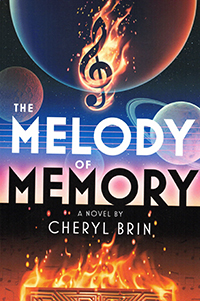The Melody of Memory by Cheryl Brin, (c) 2021, ISBN 9781953-034694; 307 pages, available on Amazon.
 The action in this debut novel by San Diego County resident Cheryl Brin occurs sometime in the distant future on a planet called Tyra, which has descended into mutual suspicion and warfare between the countries of Altira and Donira. Altira has a feudal system of government, dominated by landowners, while Donira has a socialist-style ideology, which some revolutionaries believe is not pure enough. Vakor, a country far more technologically advanced than either of the two rivals, once dominated the planet and its rulers would like to do so again.
The action in this debut novel by San Diego County resident Cheryl Brin occurs sometime in the distant future on a planet called Tyra, which has descended into mutual suspicion and warfare between the countries of Altira and Donira. Altira has a feudal system of government, dominated by landowners, while Donira has a socialist-style ideology, which some revolutionaries believe is not pure enough. Vakor, a country far more technologically advanced than either of the two rivals, once dominated the planet and its rulers would like to do so again.
The story is told through the eyes of Aya Voss, whom we watch growing up from elementary school age to young womanhood. She is an outsider wherever she goes; first in Altira because her grandparents are Donirans, and later in Donira, because she had lived in Altira before the war broke out. Under such circumstances, friends are hard to come by, and when she makes some, she loyally holds on to them.
Although Altira and Donira both abandoned the technology that enabled their forebears to navigate the stars from the New Mars colony to Tyra, there was one high-tech invention that both countries held onto: Memory music boxes to which unhappy memories, via surgical intervention, could be consigned, never troubling a person again unless the box were opened and the melody within played. The music would bring all the unpleasant memories back. This was a useful invention, no doubt, in the two societies where civil rights were routinely trod upon, executions were a common punishment, and plague and warfare would become major disruptors of day-to-day life.
In the course of the novel, Aya suffers the loss of family members, endures hunger and poverty, and is viciously beaten, among other mishaps. Yet, she somehow retains an overall optimism, believing that Alturans and Donirans have much in common, notwithstanding the way their leaders manipulate the populace to mutual hatred. She, for one, resists the memory operation that would give her blissful forgetfulness.
The story is told in a world filled with fantastic animals that Brin has conjured in her imagination, perhaps not surprising given that she has been married for many years to author David Brin, the winner of the science fiction genre’s Hugo Award among other distinctions. Cheryl is a geochemist; David is an astrophysicist, and one can only imagine the flights of fancy they might share around the dinner table.
Fiction writing often involves taking known facts or situations, giving them a little twist, and adding to them speculative imagination. The Brin family’s Judaism surely was a factor in this scene after Aya’s grandmother died: “Grand-papa burst into the room, moaning and ripping his shirt in despair. .. ‘Don’t let it scare you, Aya. It’s our way of expressing grief. When a mourner rips his clothes, it symbolizes ripping apart a union, a lifetime, in fact. Without her, he now considers himself only half a person.’ … Days passed, with neighbors bringing trays of food and offering condolences…”
Imagine that, sitting shiva in space.
Another section of the novel, when freedom fighters are trying to overthrow their oppressors, sounds like a scene from 20th and 21st century Earth. There are brutal Nazi-like reprisals against innocent civilians, and suicide bombings by revolutionaries.
This novel also includes picturesque zeri-cycles that zig zag through the streets; menacing revo-guns paraded by soldiers; golden hykloras, large beasts that look somewhat disdainfully at lesser animals like horses; three-eyed gruets, which are birds that scoop up viri-mice and tuck them into their pouches; and for those wondering what people might like to eat on such a planet, nine-layer chironas, which are irresistible pastries.
While addressing some serious issues, Cheryl Brin’s novel also is fun to read, both for adults and, I believe, for adolescent audiences.
Republished from San Diego Jewish World


























